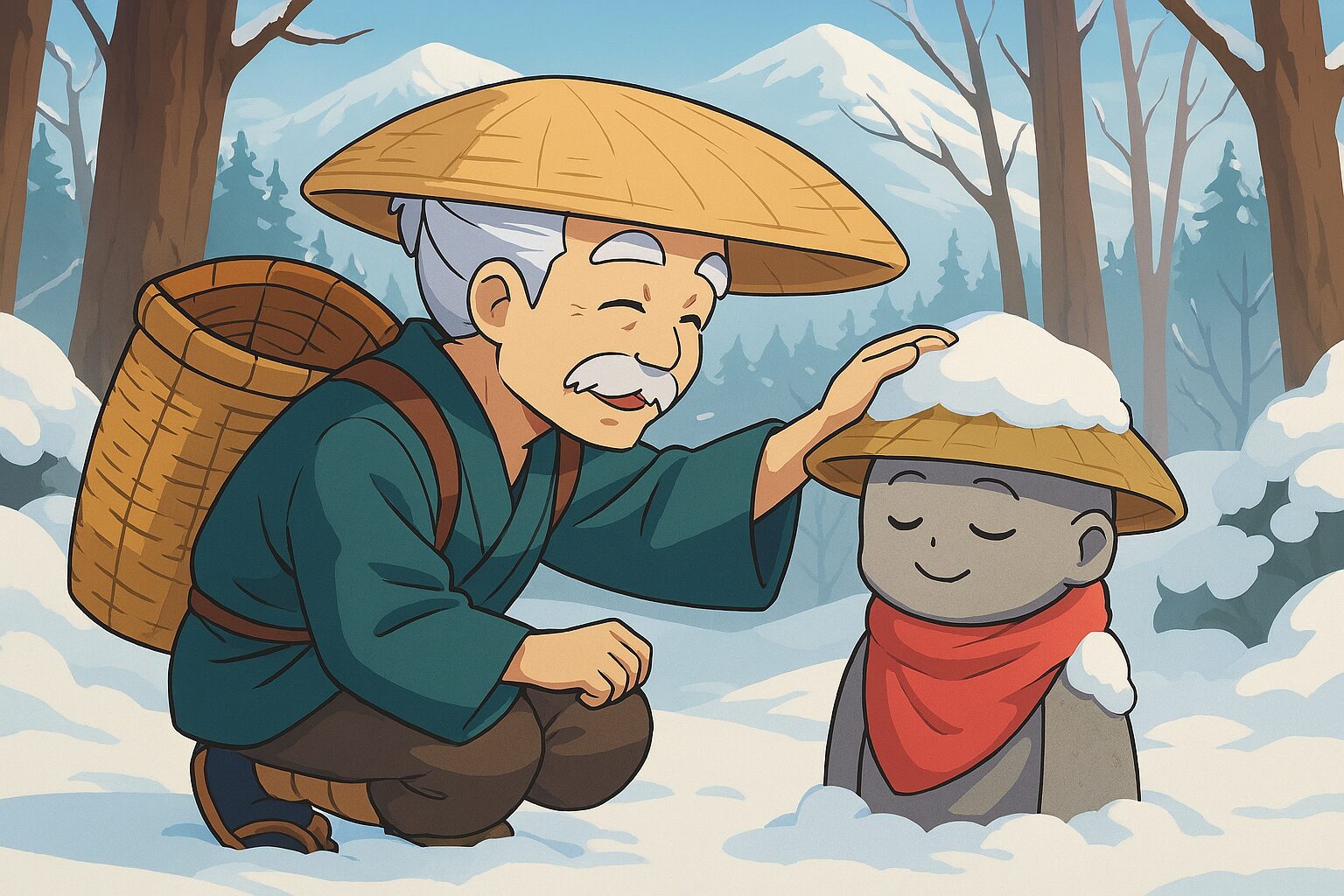This article introduces the traditional Japanese story “Saru Jizo” in a way that’s easy for international readers to enjoy and understand.
- ❄️ A Snowy Encounter: The Beginning of the Tale
- 🌙 A Nighttime Miracle: The Monkeys Arrive
- 🧘 Jizo Belief and the Symbolism of Monkeys
- 💡 Lessons from the Story: Kindness Comes Full Circle
- 📖 Explore More Japanese Folktales
- ✨ Closing Thoughts: Stories That Connect Hearts
- ❄️雪の中の出会い:物語のはじまり
- 🌙夜の奇跡:猿たちの訪問
- 🧘地蔵信仰と猿の象徴
- 💡物語の教訓:優しさは巡る
- 📖他の昔話も読んでみませんか?
- ✨終わりに:物語がつなぐ心
❄️ A Snowy Encounter: The Beginning of the Tale
Long ago, in a snowy mountain village, an elderly man and woman lived a humble life. One winter day, the old man went out to gather firewood. As he walked through the snow-covered path, he noticed a Jizo statue buried in snow, its face barely visible and seemingly shivering in the cold.
Moved by compassion, the old man gently placed his straw hat on the statue’s head and wrapped it with an old cloth. He bowed respectfully and whispered, “May you not catch cold.” It was a pure act of kindness, given without expecting anything in return.
🌙 A Nighttime Miracle: The Monkeys Arrive
That night, as the couple sat quietly by the hearth, strange sounds echoed outside—“Kii kii… Don don…” Curious, the old man opened the door and was astonished to see a group of monkeys dressed like Jizo statues. They wore straw hats and cloths, just like the ones he had offered earlier.
Without speaking, the monkeys began delivering sacks of rice, mochi, vegetables, and fruits into the house. The old man and woman were overwhelmed with gratitude. “Could it be… that Jizo-sama is rewarding our kindness?” the old man wondered. The monkeys bowed deeply and disappeared into the snowy night.
🧘 Jizo Belief and the Symbolism of Monkeys
Jizo Bodhisattva is a beloved figure in Japanese Buddhism, known for protecting children, travelers, and the souls of the deceased. Statues of Jizo can be found along roadsides and in cemeteries throughout Japan.
Monkeys, too, have spiritual significance in Japanese folklore. The character for monkey (申) is associated with communication and divine messengers. In this tale, Jizo appears in monkey form, blending nature and faith in a uniquely Japanese worldview.
Learn more about Jizo Bodhisattva on Wikipedia.
💡 Lessons from the Story: Kindness Comes Full Circle
- Acting selflessly for others
- Small kindnesses can lead to great blessings
- Never forget the power of gratitude
“Saru Jizo” reminds us that even in today’s fast-paced world, compassion and sincerity are timeless virtues.
📖 Explore More Japanese Folktales
Browse the full series here: Japanese Folktale Series
✨ Closing Thoughts: Stories That Connect Hearts
“Saru Jizo” is a quiet miracle wrapped in snow. It carries the values of kindness, gratitude, and spiritual respect that have shaped Japanese culture for centuries. We hope this story touches your heart and inspires you to share kindness in your own life.
© Japanese Folktale Series
🐒猿地蔵|優しさが奇跡を呼ぶ日本の昔話
海外の読者にもわかりやすく、日本の昔話「猿地蔵」を紹介します。
❄️雪の中の出会い:物語のはじまり
昔々、雪深い山里に、年老いたおじいさんとおばあさんが住んでいました。ある冬の日、おじいさんは薪を拾いに山へ向かい、雪に埋もれた地蔵様を見つけます。寒そうな地蔵様に、わら帽子と布をかぶせてあげるおじいさん。その優しさは、見返りを求めない純粋なものでした。
🌙夜の奇跡:猿たちの訪問
その夜、地蔵様の姿をした猿たちが現れ、米俵や餅、野菜などを家に運び入れます。おじいさんの善行に報いるため、地蔵様が猿の姿を借りて現れたとされるこの場面は、日本の信仰と自然観が融合した象徴的な描写です。
🧘地蔵信仰と猿の象徴
地蔵菩薩は日本の仏教文化において、子供や旅人を守る存在として親しまれています。猿は神の使いとされることもあり、神仏の意志を伝える存在として描かれることがあります。
詳しくは 地蔵菩薩とは?(Wikipedia) をご覧ください。
💡物語の教訓:優しさは巡る
- 誰かのために行動すること
- 小さな親切が大きな幸せを生むこと
- 感謝の心を忘れないこと
「猿地蔵」は、現代社会においても重要な価値を教えてくれる物語です。
📖他の昔話も読んでみませんか?
昔話シリーズの一覧はこちら:日本昔話シリーズ一覧
✨終わりに:物語がつなぐ心
「猿地蔵」は、雪の中の静かな奇跡を描いた物語です。日本人が大切にしてきた「思いやり」「感謝」「信仰」といった価値が込められています。海外の読者の皆さんにも、この物語が少しでも心に残るものであれば幸いです。
© Japanese Folktale Series



コメント